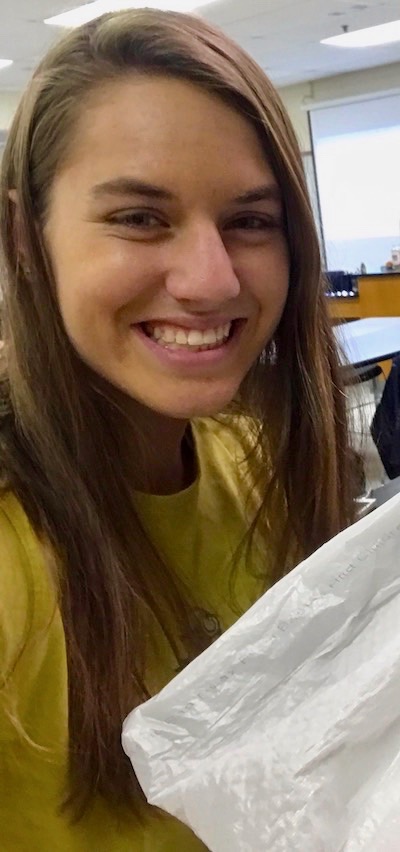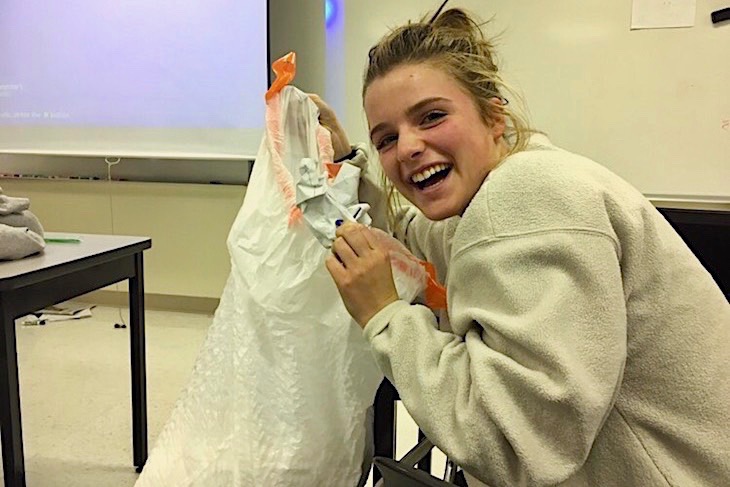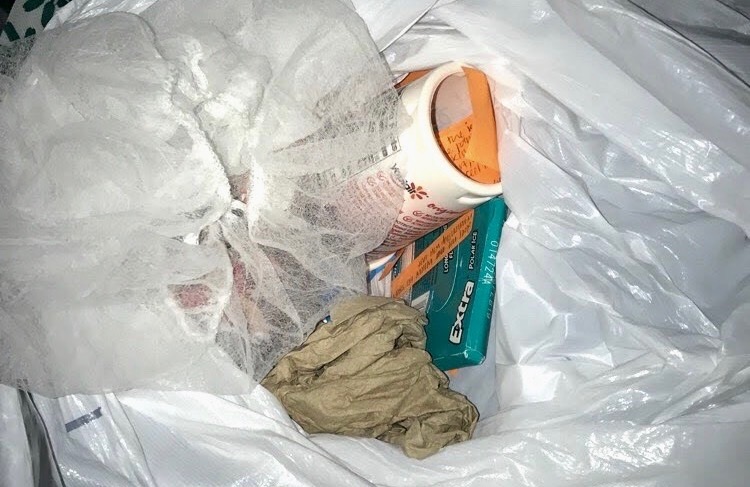Heavy Burden: BHS Students Spend a Week Carrying Their Own Trash
by Sarah Hager, BHS senior and BPS101 Communications Department intern
The average American produces about 4.4 pounds of trash a day. With a population of approximately 327 million, the United States generates more than 1.4 billion pounds of trash daily. The size and debilitating effect of this statistic are massive. However, most people are unaware of how much they throw out. Batavia High School science teacher Mr. Renz is trying to change this. Included in the curriculum of his AP Environmental Science class is a week-long lab in which students carry their trash with them everywhere they go.

Sarah Hager, Batavia High School senior and trash collector.
Mr. Renz began incorporating this lab into his teaching five years ago. On Monday, November 27, 2017, a new round of students began the study. Garbage cans and recycling bins became useless as the students were only allowed to put their waste into their personal trash bags. Initially, carrying this burden through the halls was slightly awkward for many of Mr. Renz’s students.
“The first two days were tough because I felt like everyone was judging me,” said BHS senior Bridget Grimm.
However, by the week’s end, lab participants had grown accustomed to always having the bag with them and even found benefit in it.
“It was very convenient not to have to walk across the room to throw something out,” Bridget said.
As the week progressed, the teens began to understand (and feel!) how much waste they truly produce. Many students quickly came to the same realization as lab participant Anna Bross.
“I never really payed attention to what I was throwing away or how much I was putting in the garbage,” Anna said.
This newfound consciousness and fear of a heavy garbage bag changed the decisions that students made during the experiment. For example, senior Dessa Bobosky cut down on the amount of snacks with disposable packaging that she had been bringing to school.

Dessa Bobosky, BHS senior and trash collector
Come Friday, it was time to empty the bags, one of Mr. Renz’s favorite moments of the lab.
“I love the faces on day five of collection,” Mr. Renz said. “[The students] truly see how much waste they are responsible for.”
The contents were sorted by type such as paper, plastic, and metal foil. Each category was then weighed and calculations were made to estimate how much of each type each individual would likely produce per year.
It became clear that paper waste is one huge issue for students especially.

Inside one student’s trash bag.
“Between school papers and college letters, it adds up and is definitely a lot more than I thought,” Anna said.
Although accumulation of this particular trash category is often out of students’ control, it serves as an example of one of many lessons the lab taught the high schoolers: proper waste disposal.
“My family is big on composting and recycling, but I would sometimes get lazy and just put everything in the garbage,” Anna said. “After taking part in this lab, I realized that a lot of my waste shouldn’t just be going in the garbage and that I need to pay more attention to that.”
In addition to understanding the makeup of their weekly waste and the importance of disposing of this refuse properly, lab participants discovered ways in which they can cut down on the trash they generate daily. Bridget and other students made moves toward products such as reusable water bottles and lunch boxes, alternatives to one-time use plastic and paper goods.
“I realized that most everything I bring to school is disposable for my convenience,” Bridget said.
This and other similar student reactions make clear that the lab achieved its purpose: to educate participants on individual waste production and the responsibility that all humans have to be mindful of the garbage they create.
“Most people live in such a throwaway world,” Mr. Renz said. “I am not asking students to become zero waste, but I think everyone can take small steps to decrease the waste produced in their life.”




